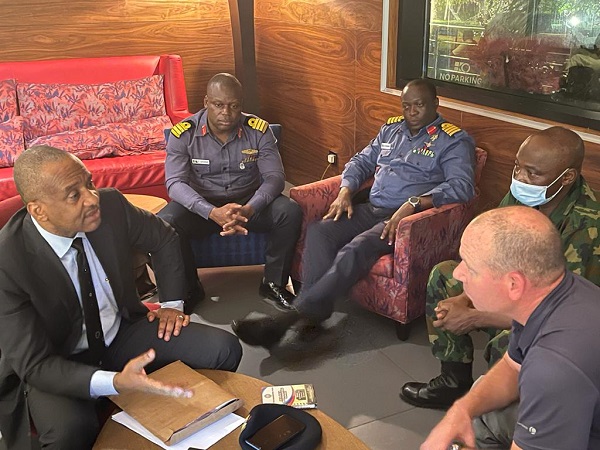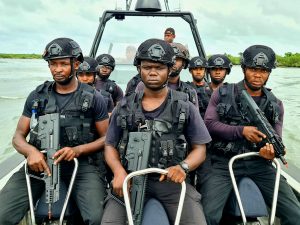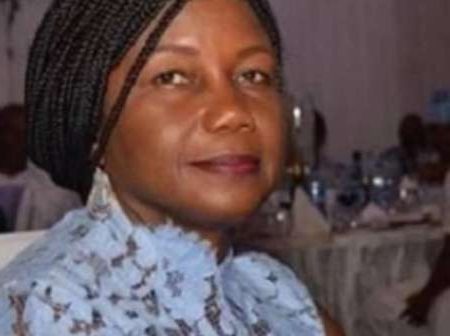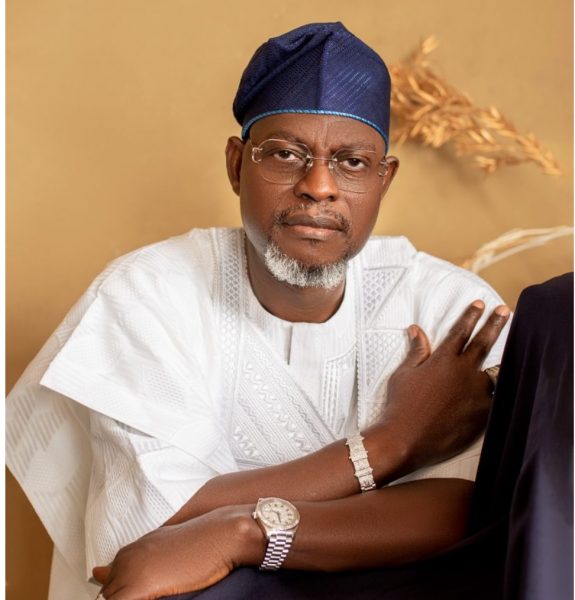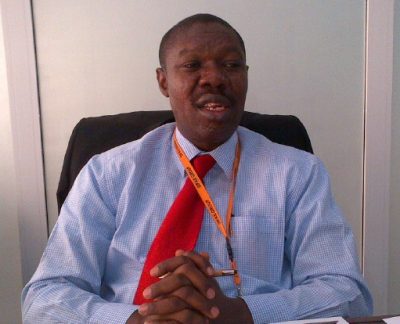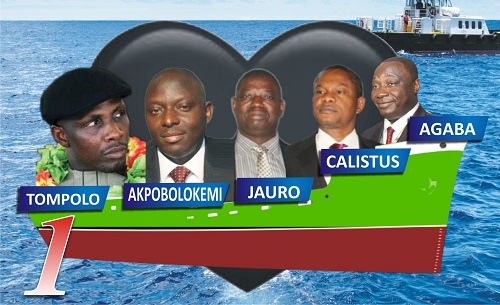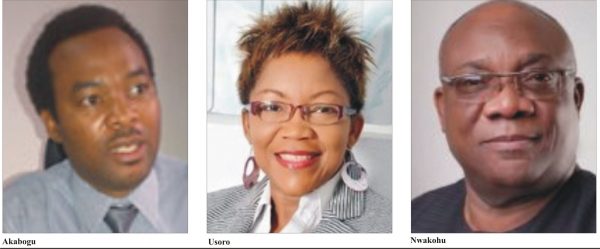SPECIAL REPORT
Jamoh’s Lessons For Effective Leadership
By Kenneth Jukpor
Effective leadership is not about making speeches or being liked; leadership is defined by results not attributes. —Peter Drucker
Few weeks ago, the Director General, Nigerian Maritime Administration and Safety Agency (NIMASA) Dr. Bashir Jamoh clocked one year in office, it has been a year that could be measured from varying prisms.
As with any new appointment into a maritime agency, it irked high expectations from maritime stakeholders and industry observers, but Jamoh’s case was peculiar because the industry’s expectations were heightened by the excitement of having a veteran with over 25 years industry and agency experience before his appointment as Director General at NIMASA.
MMS Plus x-rays his performance amid the recurring challenges in the maritime sector such as piracy, marine environment management for litters, ship scraps, oil pollution, seafarers development, indigenous shipping, among others. There would also be emphasis on the COVID-19 pandemic and the agency’s strides to sustain shipping under the new normal, even as we outline the collaborative efforts of NIMASA and set a progressive agenda for the next three years.
Few weeks after into his administration, Jamoh highlighted the three core areas the new executives will channel their efforts to deliver value to all stakeholders in the maritime sector. Our analysis will be anchored on these key areas, which are; Maritime Security, Maritime Safety and Shipping Development and Capacity Building.
Maritime Security
After four years as the Executive Director, Finance Administration in the last executive leadership at NIMASA, Jamoh had been at the crux of meetings under the Deep Blue Project. The Deep Blue Project is a holistic security effort by the Nigerian government to address maritime insecurity by providing an integrated surveillance and security architecture that aspires to combat maritime crime in Nigeria’s waterways up to the Gulf of Guinea through the acquisition of appropriate platforms and trainings.
Some of the assets to be utilized for the Deep Blue Project are; 2 Special Mission Vessels, 17 Fast Interceptor Boats, 4 Unmanned Air Vehicles, 6 Amoured Vehicles, 3 Special Mission Helicopters, 2 Special Mission Aircraft, C4i Centre for intelligence gathering, among others.
Although the project appears to be running behind schedule, in the last one year the project has moved from 60% completion to over 90% and should have attained 100% already, if not for the COVID-19 pandemic and consequent challenges.
Last week, the Director General of NIMASA revealed that the Special Forces to operate the Deep Blue Project have finished their training and are ready to go. These officers represent the crucial human element of the entire architecture given their expected interdictory role of tackling piracy and protecting seafarers. A Deep Blue Commander has already been appointed from the Nigerian Navy to lead the personnel under the Deep Blue Project.
With these developments, the maritime sector is hopeful that the narrative of security threats and piracy in Nigeria and the entire Gulf of Guinea (GoG) will be a positive one by the end of the year.
Meanwhile, the first quarter report of the International Maritime Bureau (IMB) for 2021 on piracy ranks GoG as the most troubled region with 43% of all reported piracy incidents around the world.
Perplexed by the piracy in the GoG, the world’s fifth-largest marine nation, Denmark has also decided to deploy a frigate to the Gulf of Guinea to checkmate the soaring wave of piracy. The nation with an average of 30 to 40 Danish operated ships voyaging through the Gulf of Guinea daily, decided on the gesture, saying it could no longer continue to watch things helplessly. Albeit, NIMASA can reassure Denmark that robust plans are in place to curb piracy as maritime security units also known as Special Intervention Force onboard fast Interceptors started patrolling the Lagos Ports Anchorage last week to ensure a more secure and safe shipping environment.
To tackle piracy, Nigeria needs to address poverty, unemployment, inequality, and corruption in the country, especially in the Niger Delta region. Access to legitimate means of earning income has also been tipped to dissipate crime and criminality. Grievances among marginalized coastal communities in the Niger Delta should be investigated so that most restive youths in the region can pursue legitimate means of livelihood and escape the cycle of deprivation that exposes them to crime. Provision of social amenities and job creation would be vital in tackling piracy.
Jamoh has shown signs to explore this approach using Jeremy Bentham’s Carrot and Stick management model. Speaking at a conference to mark the 2020 World Maritime Day (WMD), the Director General of NIMASA, Dr. Jamoh proposed Jeremy Bentham’s Carrot and Stick approach, noting that NIMASA and other stakeholders should seek to address the root causes of challenges like piracy, marine litters, among others.
Under the carrot approach, he disclosed that the agency had already initiated talks with the Small and Medium Enterprises Development Agency of Nigeria (SMEDAN) to develop Small and Medium-sized Enterprises (SMEs) in fishing, marine litter management and other businesses and vocations around the maritime domain.
He also opined that deepened investment in developing Nigerian seafarers via enhanced service delivery and equipment at the Maritime Academy of Nigeria (MAN) Oron, would also serve as a good motivation for human capital development in the sector.
The military should be provided with better equipment to fight pirates and armed robbers at sea. The Nigerian Navy has shown its military prowess in fighting piracy within the Niger Delta and the Gulf of Guinea. However, fighting crime at sea requires teamwork that should involve other stakeholders and other security agencies in a coordinated manner.
A major accomplishment under maritime security is the Suppression of Piracy and Other Maritime Offences (SPOMO) Act. The Act got the first trial case when ten pirates were apprehended last year. They had attacked and boarded a Chinese vessel, MV HAILUFANG II, off the coast of Côte d’Ivoire and directed it towards Nigerian waters. They were arrested by the Nigerian Navy, which dispatched a ship to intercept the vessel after it got an alert.
The SPOMO Act 2019, which was drafted by Dr. Jamoh while he was an Executive Director, should consistently be enforced whenever pirates are arrested to dissipate the scourge of piracy and armed robbery at sea.
NIMASA, Nigerian Navy in collaboration with the Inter-regional Cordination Centre (ICC) Yaounde, recently entered partnership to jointly lead the effort alongside other nations to tackle piracy in the GoG through a well-thought-out framework.
Maritime Safety
Safety as it relates to NIMASA involves search and rescue operations, marine environment management with emphasis on marine litters, scraps, ship wrecks, ballast water management, oil spillage and offshore waste control.
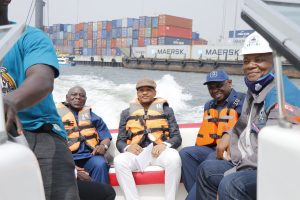
This also includes standards of ships, barges, emission control, BASEL Convention which advocates preventing transboundary movements of hazardous waste, among others.
In January this year, the Minister of Transportation, Hon. Rotimi Amaechi identified marine environment management as a crucial factor that enables the maritime sector to contribute to national economic growth. Indeed, a clean and safe marine environment is the bedrock that ensures the entire maritime industry contributes significantly to the growth of a nation.
To address marine and plastic pollution on the marine environment from the producing companies and coastal communities, in line with the International Convention for the Prevention of Pollution from Ships (MARPOL); the Convention on the Prevention of Marine Pollution by Dumping of Wastes and other Matter (London Convention), 1972, among others, NIMASA took a massive step with the launch of a Maritime Action Plan on Marine Litter and Plastic (MAP-ML+P) Management in Nigeria, last year.
However, under Jamoh’s leadership, the agency has taken a back seat in this area. MAP-ML+P was launched one month before the new executive management came onboard last year in an event that was celebrated by maritime stakeholders and the nation at large. The Senate, Ministry of Environment and private sector investors in recycling also attended the event which not only centred on waste removal, but also explored wealth creation and employment
for the teeming Nigerian youth via recycling.
Ship wrecks have also been a recurring challenge in the last one year which the NIMASA helmsman outlined as a major challenge in his first media parley after 100 days in office but the menace is yet to be addressed.
However, the Director General of NIMASA revealed last month that the Federal Executive Council (FEC) approved the first phase removal of wrecks and derelicts on the nation’s waters.
The onus of removing wrecks is also found in the Nigerian Ports Authority (NPA) and National Inland Waterways Authority (NIWA) Acts. However, both agencies agreed that NIMASA should take up the responsibility after a joint meeting of heads of maritime agencies in the second quarter of 2020.
While there have been improvements in ballast water management, oil spillage and offshore waste control has been a conflicting issue between the agency and the Department of Petroleum Resources (DPR). Amid this fracas, International Oil Companies (IOCs) continue to have a field day discharging waste offshore without sufficient regulation.
The response time for search and rescue also has to be improved, and more progress is anticipated with the assets under the Deep Blue Project such as; the C4i Centre and 17 Fast Interceptor Boats will help expedite search and rescue activities.
NIMASA, however, has been keen to enforce strict compliance with the International Maritime Organization (IMO) regulation prohibiting ships from burning marine fuels with sulphur content higher than 0.5 pct.
To achieve this, the agency has focused on the availability of marine fuels that comply with the regulation by the IMO. According to the NIMASA Director General, who was represented by Acting Head, Marine Environment Management (MEM) Department, NIMASA, Mr. Isa Mudi, when the agency met with modular and other refinery operators and fuel oil suppliers in the country, “Nigeria has an advantage ab initio, because we produce low sulphur crude. The challenge for us now is conversion of this advantage to availability of bunker fuels that meet the IMO mandate.”
Shipping Development & Capacity Building
Indigenous ship owners had the most expectations following the emergence of the new executive management at NIMASA, having accused the immediate-past administration of not doing anything to improve indigenous shipping.
The new management hasn’t put in a wrong foot to correct the dwindling state of indigenous shipping, with crucial engagements and assurances from the Nigerian National Petroleum Corporation (NNPC) to engage Nigerian ship owners for Cabotage trade on petroleum products transshipped from offshore Lagos to other parts of the country. NIMASA has also obtained assurances of a change in trade terms for crude affreightment from Free on Board (
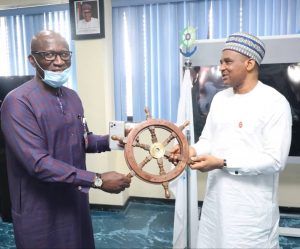
FOB) to Cost Insurance and Freight (CIF).
While these engagements are important, the reality is that they are yet to yield desired results as NNPC which imports over 90% of the nation’s petroleum products still engages foreigners for more than 80% of oil shipping contracts within the country. This is in contravention of the Cabotage Act which stipulates that such services be reserved exclusively for Nigerians.
Ship building and repair yards are yet to make a significant development under the period under review. Again, NIMASA hasn’t been short of engagement in this regard but vital issues like Customs duties on ships and spare parts are yet to be removed.
For ship repairs, however, the N50billion NIMASA Floating Dock has only recently gotten an arrangement with NPA to be gainfully utilized. Although its operation is yet to take off, if deployed, the floating dock would be a major accomplishment for the new NIMASA team where its predecessors failed in four years.
There are still scarce and limited opportunities for seafarers in the country and this is a reflection of the disadvantaged position of Nigerian ship-owners. In one year, NIMASA has only excitedly revealed that there has been another Presidential approval for the disbursement of the Cabotage Vessel Finance Fund (CVFF). However, under the current NIMASA leadership nothing will be seen as an achievement in this regard until the funds are eventually disbursed.
In line with the agency’s mandate of developing capacity for the maritime industry, NIMASA has concluded plans to train 250 cadets for sea-time and Certificate of Competence (CoC) in the Philipines, UK & Romania. This, according to Jamoh is in keeping with one of his three performance pillars known as ‘Shippibg Development’.
The problem with seafarers development via the Nigerian Seafarers Development Programme (NSDP) as well as others from other academies, is that there are limited opportunities for seatime and eventual permanent employment opportunities onboard vessels.
COVID-19 Efforts
While the world observed a lockdown during the climax of the COVID-19 pandemic terror, shipping continued across most nations to guarantee that essential cargoes including medical supplies were delivered on time, and in a safe manner and NIMASA was central to sustainable shipping operations at the turbulent times.
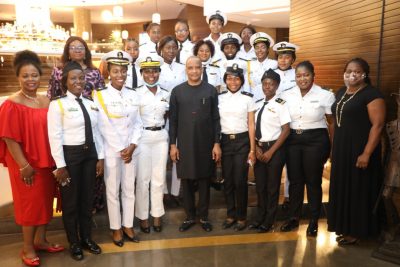
The agency extended the validity of statutory and trading certificates for all Nigerian registered vessels, including Standards of Training, Certification and Watchkeeping (STCW) certificates for seafarers to ensure uninterrupted shipping, despite the pandemic.
Subsequently, NIMASA developed and published several guidelines as Marine Notices directing that all duties of dockworkers in the nation’s seaports, terminal and jetties are essential to the economy of the country and as such dockworkers should be granted passage to and from their residence to seaports/ terminal and jetties to perform their duties.
The agency also stressed the mandatory use of nose masks within all terminals and jetties, mandatory temperature to be conducted on all members of staff before accessing the terminals and individuals whose temperature read above 38°C shouldn’t be allowed entry.
While clarity on the status of seafarers and dockworkers was speedily provided, NIMASA also directed that all suspected cases of COVID-19 infections be isolated and promptly reported to the Nigeria Center for Disease Control (NCDC).
The agency directed employers to take the onus of providing adequate protective clothing and protective equipment at no cost to the dockworkers; also urging dock labour employers to devise methods of ensuring that all dockworkers who were absent from their duties as a result of COVlD-19 be quarantined and compensated for the suspension of earnings they suffered as a consequence.
NIMASA frequently updated its guidelines for all ships operating on Nigerian waters, banning all vessels without thermal screening facilities from operating in the country. This development ensured shipping companies and other maritime operators followed procedures stipulated by United Nations agencies including the World Health Organization (WHO), the International Maritime Organization (IMO) and the International Labour Organization (ILO), as well as the NCDC.
In line with measures to curb the spread of COVID-19, all milling around port premises halls, playing of games and unnecessary loitering were prohibited; even as NIMASA directed all dock labour employers to ensure social distancing of two meters maintained between people in the workplace and other public spaces within and around port terminals.
These guidelines given to stevedoring companies, dock labour employers, shipping companies, dockworkers and stakeholders at all terminals and jetties within the Nigerian maritime domain; were in sync with global best practices and the NCDC guidelines.
Employers of dock labour or stevedoring companies were mandated to provide adequate insurance cover for health, personal injury, loss of earnings, and compensation, relating to any incident affecting dockworkers or stevedores in the course of the work of the dock labour employer or the stevedoring company.
Beyond the operational directives for the shipping industry, NIMASA also made germane and altruistic donations of crucial medical equipment such as ventilators, ambulances, vans and the essential interceptor boats and personnel for the fight against the pandemic via waterways.
NIMASA handed over N20million monetary donation, three ventilators, an ambulance and fast intervention vessels to the Lagos State government to support the fight against coronavirus; with the Director General, NIMASA, Dr. Bashir Jamoh describing the gesture as the agency playing the role of a responsible tenant with its headquarters situated in Lagos State.
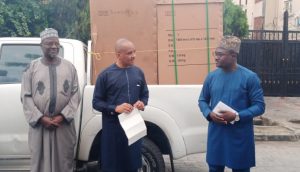
Lagos State government was better equipped in the war against COVID-19 as NIMASA supported with ventilators, testing materials, ambulances, fire brigade machines to be used to spray chemicals to reduce the virus, a 36-seater bus, a 16-seater bus, oxygen concentrator, personal protective equipment, hand sanitizers. However, the agency also made similar donations at the Federal capital Territory, Delta, Rivers, Cross Rivers and Kaduna States along with cash donations to some of the states with reported cases of the pandemic.
Collaborative Engagements
In a show of sportsmanship and collaboration, NIMASA joined the Maritime Task Team (MTT) setup to expeditiously address day-to-day port sector challenges.
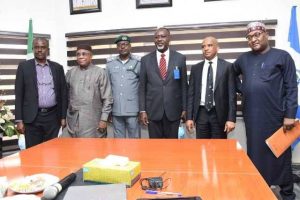
This development, however, wasn’t unexpected as the NIMASA Director General’s highly celebrated maritime book, “Harnessing Nigeria’s Maritime Assets, Past, Present & Future”, advocated the development of an Integrated Marine Plan (IMP) for Nigeria where regulators and operators set a roadmap, clear vision, high-level goals and carry out integrated actions.
MTT later metamorphosed into a crucial monthly meeting of Chief Executives of maritime sector agencies and the NIMASA Director General has been central to the group’s success with modest successes in eliminating overlapping functions.
Despite the challenges posed by COVID-19, Jamoh and his exquisite executive team has either visited or hosted Chief Executives or helmsmen at Nigerian Ports Authority (NPA), Nigerian Navy, Nigeria Customs Service (NCS), Nigerian National Petroleum Corporation (NNPC), Nigerian Police, Nigerian Shippers’ Council (NSC), National Inland Waterways Authority (NIWA), Council for the Regulation of Freight Forwarding in Nigeria (CRFFN), Ship Owners Association of Nigeria (SOAN), Maritime Workers Union of Nigeria (MWUN), National Association of Stevedoring Companies (NASC), various media groups, among others.
While most of the issues deliberated by the agency focused on the emerging challenges amid the COVID-19 pandemic, the meeting afforded the agency ample time to discuss other issues such as plans to harmonize training procedures with Nigerian Navy to effectively safeguard the country’s maritime space, boost efforts with Customs to eliminate loopholes in the Temporary Importation Permit (TIP), system often exploited by importers to avoid government levies.
The NIMASA leadership has also had engagements on crude affreightment with NNPC, seeking more opportunities for indigenous ship owners and a change in trade terms from FOB to CIF.
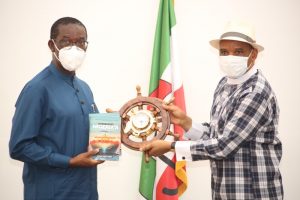
State Government engagements have also been organized with the NIMASA Executives visiting the Lagos State Governor, Mr. Babajide Sanwo-Olu and Delta State Governor, Dr. Ifeanyi Okowa. The Bayelsa State Governor, Senator Douye Diri also visited the NIMASA headquarters as the agency explored strategies to boost marine investments in the coastal states while curbing marine incidents and security threats.

